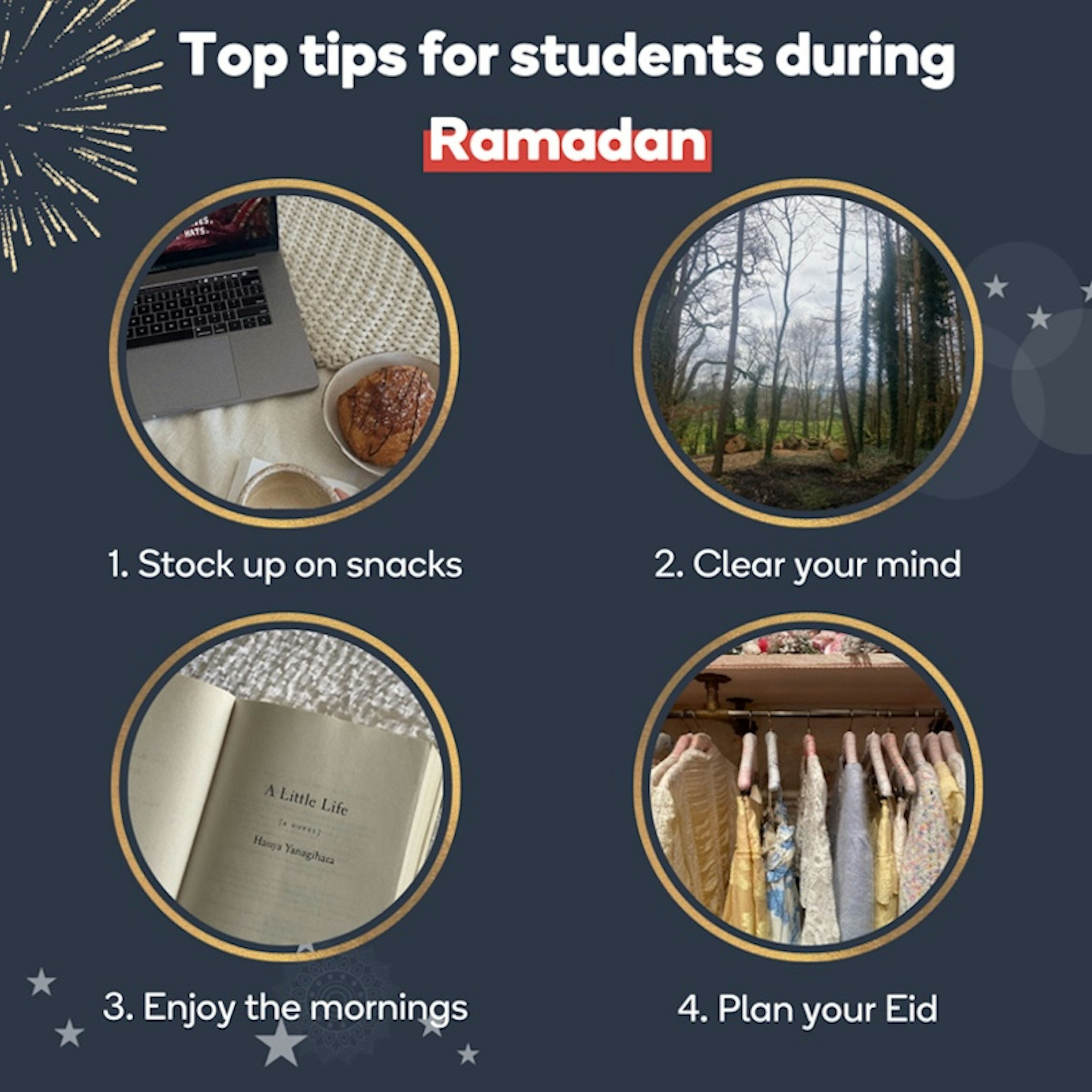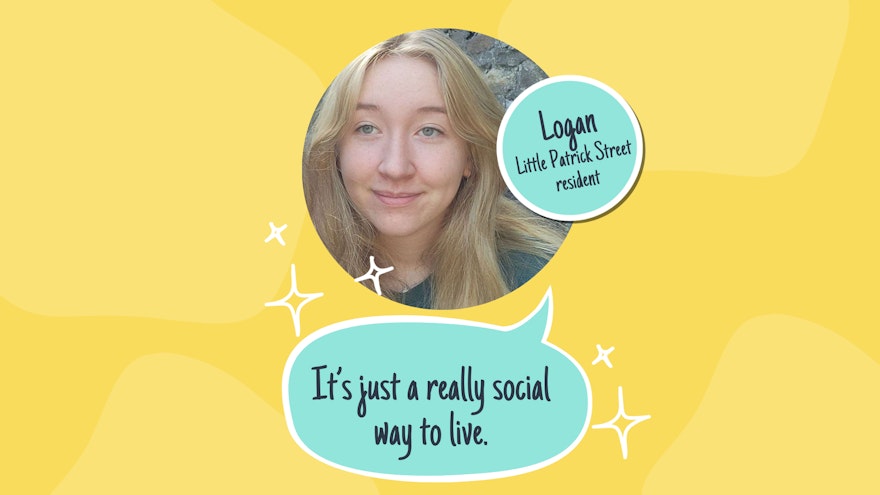During the holy month of Ramadan, we caught up with John Bell House resident Anaiba to learn more about her experience of observing Ramadan while studying at the same time.
Read on to learn what Anaiba had to say about getting the right balance, during her time in our Belfast student accommodation.
The month of Ramadan
Ramadan is the holy month of fasting and one of the five pillars of Islam. It consists of refraining from eating and drinking from sunrise until sunset. Fasting in this way has many psychological and physical benefits, making it something that both Muslims and non-Muslims alike can participate in. These benefits include prevention of chronic diseases, uplifted mood, lower blood cholesterol, etc.
Student life and fasting (plus a few tips!)
The student experience of Ramadan is unique due to balancing studying, part-time work and overall maintaining energy. Not to mention making edible food for sehri (pre-fasting meal) and iftar (fast-breaking meal).
It can be hard to balance fasting alongside daily tasks. The key to be able to get through your days is eating a well-balanced healthy meal for sehri, maybe have some coffee to keep you energised, if that’s your thing. A big part of where students go wrong is by eating nothing for sehri or eating a small meal.
A little tip to stay hydrated during your fasts is by having some yogurt in the morning, it may be a bit random, but it works!
If dehydration and hunger doesn’t get to you during Ramadan, the stress of everything piling up on you could. Every student can attest to the feeling of the list of assignments growing, the draining hours at work, the fact that you forgot that one thing on your to-do list again! A good way to destress, aside from the fast itself, is to take time to go for a walk every now and then. Just a short walk can go a long way!
As a first-year student, working a part-time job, I’m discovering that the student experience of Ramadan is vastly different. Between fasting, working, praying and studying, I’m finding very little time for myself, or even time to fit all these things in one day. So this month, everything feels like it’s on a time crunch.
But here are some things that can help you make the most of observing Ramadan as a student:
- Stock up on your favourite snacks
For iftar, there’s nothing like knowing you’re going to break your fast and eat your favourite things. Stocking up on things like frozen spring rolls or your favourite fruits or whatever you know you will enjoy, no matter what, is an infallible way to ensure each iftar is enjoyable and delicious. - Use the clarity gained from your fasts
Fasting clears your mind and helps you focus on the things that truly matter. The clarity that this month provides can help you become more organised, set firm goals, and improve your character. - Learn to enjoy the early mornings
While I am not a morning person, everything is a lot calmer when you’re up before 6am, so enjoy that time. I know first-hand how sleep overtakes everything else that early in the morning, but after having your sehri, you can spend an hour or so enjoying some much-needed self-care time. Regardless of what form self-care takes on for you, whether that’s watching an episode of your favourite show or doing a face mask while reading a book, it will help set the tone for the day. - Plan your Eid!
It’s never too early to start planning your Eid outfit or thinking about what you’re going to be doing on the day, whether that’s going home to see your family or a fun day out with friends. Planning and prepping for Eid will give you something to look forward to after the long days of fasting and studying.
This is just a glimpse inside student life during Ramadan and a few helpful tips to enhance the observation of the holy month! We’re already deep into the month and will soon be celebrating the blessings and benefits that come with it, remember to slow down, and enjoy this time of year. Ramadan Mubarak!

Thanks to Anaiba for such a personal and helpful account of observing Ramadan as a student. Looking for more tips or want to learn more about Ramadan? You can read a graduate’s experience of Ramadan at university here, plus some more tips from students in our Newcastle student accommodation below.
Amal from Newcastle 1
A typical day in the life during Ramadan
During Ramadan, my typical day begins with fasting at approximately 4:50am. I engage in prayer and read the Quran. Afterwards, I go back to sleep and wake up at 7:40am to attend university. I return home around 4-5pm and prepare a light iftar, which usually consists of dates and hot soup (and prefer to start with a light meal). I perform my prayers. After two hours, I have a heavier meal. Throughout the night, I make sure to drink enough water. For the pre-dawn meal, known as sohoor, I usually have a banana and yogurt, as they help sustain me throughout the day.
Tips for students celebrating Ramadan away from home for the first time
For students experiencing Ramadan away from their hometown for the first time, I suggest embracing the occasion and creating their own celebrations. One way to achieve this is by decorating with Ramadan lights, which can help evoke a sense of home.
What Ramadan means to Amal
To me, Ramadan holds great significance. It serves as an opportunity to become a better person and to pray to Allah for all my wishes. Each time Ramadan arrives, it teaches me the virtues of patience, self-control, and empathy towards others.
Ahmed from Newcastle 1
An introduction to Ramadan
It is the ninth month of the Islamic calendar. Allah revealed the Quran, the holy book of Islam, to Prophet Muhammad during this month. The night when Allah sent down the Quran from heaven to earth is known as the Night of Power, or Laylat-al-Qadr as called in Arabic. This great night can take place on any day of the 10 last days of Ramadan, this is why Muslims perform more prayers and worship Allah even more during these 10 days, just to make sure they catch the Night of Power. Allah says in the Quran that the Night of Power, Laylat-al-Qadr is worth more than a thousand months of worshipping.
During Ramadan, Muslims get closer to Allah through fasting from dawn until sunset, praying, avoiding committing any sins, reading the Quran’s 6,346 verses at least once during the month (it is not obligatory, but is recommended for immense blessings and rewards in this life and in the afterlife).
There are some habits that most Muslims have in common during Ramadan such as having a late dinner to help with the fasting. I am talking about having a big meal around 12am, then the fasting starts with the first prayer, Fajr, at around 4:50 am. During the fasting no eating, no drinking and even no negative or bad behaviours; so the fasting is not exclusive to only food and drinks. Muslims break their fast when it is time for the fourth prayer at sunset. Usually, Muslim families prepare a wide variety of food. After breaking the fast with dates and water, some Muslims would pray the fourth prayer, Maghreb, and then have a big meal that consists of several types of food; while some others would eat first then pray.
A typical day in the life during Ramadan
As a student, I tend to have a big meal around 6:40pm when it is time to break the fast. Then, I would have a small meal around 9:30-10pm and make sure I drink enough water so I would not suffer from dehydration during the fast. I would go to bed at 12am, and get up at 7-8am. Then, I would go to uni like normal; and repeat.
Tips for students celebrating Ramadan away from home for the first time
For students who have never celebrated Ramadan away from home, I would suggest that they break their fast like they usually do, and most importantly keep themselves hydrated (so they should drink lots of water during their breakfast). Then, they can go about their lives like they normally do. After that, when they go to bed, I recommend that they go to bed earlier than they usually do, around 8pm and get up early at 4 am so they would have around one whole hour to eat something and drink water. By doing this, their fast will be a lot easier, but they have to start the day early or they could just get up at 4am, eat and drink then maybe go back to sleep if they can.




